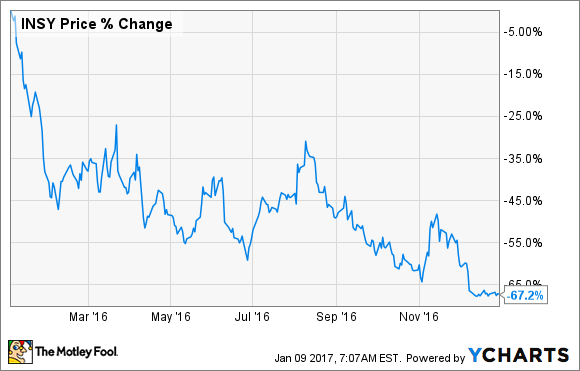
Image source: Getty Images.
What happened
A series of negative events caused shares of Insys Therapeutics (INSY) to collapse in 2016. The stock price of the biotech, which focuses on products to treat pain, fell by more than two-thirds during the year, according to data from S&P Global Market Intelligence.
So what
Here's an overview of the key events that moved shares during 2016.
- Insys started the year on the defensive. In early January, the company felt the need to issue a press release defending its use of patient service centers that helped potential customers gain reimbursement access to Subsys, an under-the-tongue spray of the synthetic opioid fentanyl that is approved to treat cancer pain. This statement was made in response to the criticisms that surfaced in a CNBC report that questioned the company's sales and marketing practices.
- In April, Insys reported preliminary results for the first quarter that came up far short of expectations. The company blamed the revenue shortfall on "heightened publicity surrounding the national opioid epidemic." Shares fell more than 20% in a single day when the news broke.
- In July, investors received some good news when the FDA approved Syndros, a liquid formulation of dronabinol, to treat anorexia associated with weight loss in patients with AIDS, and nausea and vomiting associated with cancer chemotherapy. Dronabinol is better known as THC, the major psychoactive compound in cannabis.
- In August, management stated that a Phase 3 trial of the company's buprenorphine sublingual spray met its primary endpoint in treating postoperative pain after bunion removals.
- In September, the company announced that founder Dr. John Kapoor would be stepping down as president and CEO as soon as a replacement could be found.
- In December, the Justice Department arrested a number of Insys Therapeutics' former employees, including former CEO Michael Babich, "on charges that they led a nationwide conspiracy to bribe medical practitioners to unnecessarily prescribe a fentanyl-based pain medication and defraud healthcare insurers."
Given the dominance of negative events, it is easy to understand why shares collapsed.
Now what
Given the growing concerns over the abuse of opioids, providers are likely to be more restrained in their use of Subsys in the future. That leaves Insys' future riding on the success of Syndros and the rest of its pipeline.
While Syndros' market opportunity exceeds nine figures annually, it is unclear if the dark clouds that surround Insys will prevent the drug from reaching its full potential. In addition, Insys' stock is likely to continue to trade erratically based on the headlines of the day. Thus, while the stock is certainly cheap, I personally think that this company is far too risky to touch.






